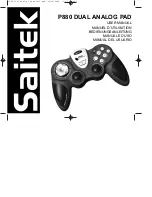
CHAPTER 22 SBC Overview
Mediant 4000 SBC | User's Manual
■
Outgoing SDP offer:
If only Allowed coders are used, the device arranges the coders in the
SDP offer as described above. However, if Extension coders are also used, the coder list is
arranged according to the SBCPreferencesMode parameter. Depending on the parameter's
settings, the Extension coders are added after the Allowed coders according to their order in
the Allowed Audio Coders Group, or the Allowed and Extension coders are arranged according
to their position in the Allowed Audio Coders Group.
SRTP-RTP and SRTP-SRTP Transcoding
The device supports transcoding between SRTP and RTP. The device can also enforce specific
SBC legs to use SRTP and/or RTP. The device’s handling of SRTP/RTP is configured using the IP
Profile parameter, SBCMediaSecurityBehaviour, which provides the following options:
■
SBC passes the media as is, regardless of whether it’s RTP or SRTP (default).
■
SBC legs negotiate only SRTP media lines (m=); RTP media lines are removed from the
incoming SDP offer-answer.
■
SBC legs negotiate only RTP media lines; SRTP media lines are removed from the incoming
offer-answer.
■
Each SDP offer-answer is extended (if not already) to two media lines for RTP and SRTP.
If after SDP offer-answer negotiation, one SBC leg uses RTP while the other uses SRTP, the
device performs RTP-SRTP transcoding. To translate between RTP and SRTP, the following
prerequisites must be met:
■
At least one supported SDP "crypto" attribute.
■
The EnableMediaSecurity parameter must be set to 1.
Transcoding where both legs are configured for SRTP is typically required to trans-encrypt and
trans-decrypt. This is relevant when the MKI and Symmetric MKI parameters are enabled. In other
words, both sides need to both encrypt and decrypt the outgoing and incoming SRTP packets,
respectively.
DSP resources are not required for RTP-SRTP transcoding.
Multiple RTP Media Streams per Call Session
The device's SBC application supports multiple RTP media streams per SBC call session. It
supports the negotiation of up to five media streams ('m=' line) in the SDP offer/answer model per
session. The media can include a combination of any of the following types:
■
Audio, indicated in the SDP as 'm=audio'
■
Video, indicated in the SDP as 'm=video'
■
Text, indicated in the SDP as 'm=text'
■
Fax, indicated in the SDP as 'm=image'
■
Binary Floor Control Protocol (BFCP), indicated in the SDP as 'm=application <port>
UDP/BFCP'
Therefore, the device supports transcoding of various attributes in the SDP offer-answer (e.g.,
codec, port, and packetization time) per media type. If the device is unable to perform transcoding
(e.g., does not support the coder), it relays the SBC dialog transparently.
- 511 -
Summary of Contents for Mediant 4000 SBC
Page 1: ...User s Manual AudioCodes Series of Session Border Controllers SBC Mediant 4000 SBC Version 7 2...
Page 40: ...Part I Getting Started with Initial Connectivity...
Page 48: ...Part II Management Tools...
Page 113: ...Part III General System Settings...
Page 118: ...Part IV General VoIP Configuration...
Page 525: ...Part V Session Border Controller Application...
Page 654: ...Part VI Cloud Resilience Package...
Page 663: ...Part VII High Availability System...
Page 685: ...Part VIII Maintenance...
Page 759: ...Part IX Status Performance Monitoring and Reporting...
Page 844: ...Part X Diagnostics...
Page 888: ...Part XI Appendix...
















































